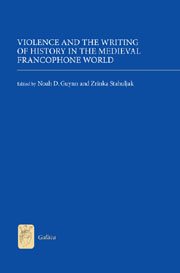Book contents
- Frontmatter
- Contents
- List of Illustrations
- List of Contributors
- Acknowledgments
- Introduction
- 1 Historicity, Violence, and the Medieval Francophone World: Mémoire Hystérisée
- Part I Theorizing Violence
- Part II Institutions and Subversions
- Part III Gender and Sexuality
- Part IV Trauma, Memory, and Healing
- 10 “Guerre ne sert que de tourment”: Remembering War in the Poetic Correspondence of Charles d'Orléans
- 11 Commemorating the Chivalric Hero: Text, Image, Violence, and Memory in the Livre des faits de messire Jacques de Lalaing
- 12 Coming Communities in Medieval Francophone Writing about the Orient
- Index
- Already Published
10 - “Guerre ne sert que de tourment”: Remembering War in the Poetic Correspondence of Charles d'Orléans
from Part IV - Trauma, Memory, and Healing
Published online by Cambridge University Press: 05 April 2013
- Frontmatter
- Contents
- List of Illustrations
- List of Contributors
- Acknowledgments
- Introduction
- 1 Historicity, Violence, and the Medieval Francophone World: Mémoire Hystérisée
- Part I Theorizing Violence
- Part II Institutions and Subversions
- Part III Gender and Sexuality
- Part IV Trauma, Memory, and Healing
- 10 “Guerre ne sert que de tourment”: Remembering War in the Poetic Correspondence of Charles d'Orléans
- 11 Commemorating the Chivalric Hero: Text, Image, Violence, and Memory in the Livre des faits de messire Jacques de Lalaing
- 12 Coming Communities in Medieval Francophone Writing about the Orient
- Index
- Already Published
Summary
Conveying the felt and complex experience of terror – which includes its conceptual antonym “peace” within it – is what poetry is all about.
Rukmini Bhaya Nair, Poetry in a Time of TerrorDuring the Hundred Years War (1337–1453), the lyric voice dramatically changed registers to express the violence and trauma suffered by the social psyche. Confirming Rukmini Nair's claim that poetry can uniquely convey the complexity of terror, late medieval francophone writers reshaped courtly poetry, a genre previously dominated by love, to give voice to contemporary anxieties concerning the matter of war. War invaded the lyric world, redrawing generic, thematic, and affective boundaries, resulting in what one scholar has referred to as a “schizophrénie littéraire.” For Adrian Armstrong and Sarah Kay, lyric accounts of social events differed markedly from traditional historical reflection in that “the presence of verse conjures an absent meaning: a ‘truth’ about history that is not to be equated with factual detail because it is located not in external reality but in (not necessarily explicit or even conscious) subjective processes of reflection, sentiment, commitment, or memory.” For these two scholars, verse allows for an alternative and personalized version of writing history and remembering the past, but in the commemorative act of lyric expression we may go a step further and claim that, through the process of transforming history into a poetic event, late medieval lyric influenced and shaped events.
- Type
- Chapter
- Information
- Publisher: Boydell & BrewerPrint publication year: 2013



